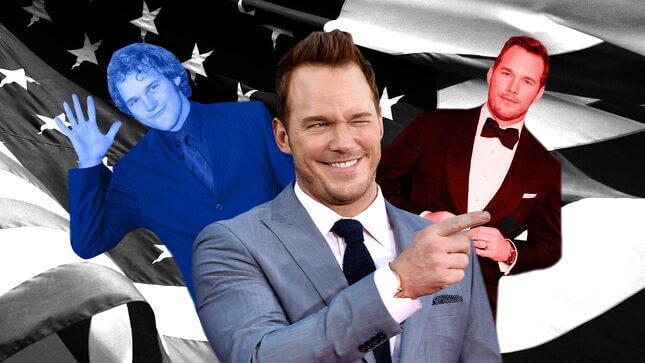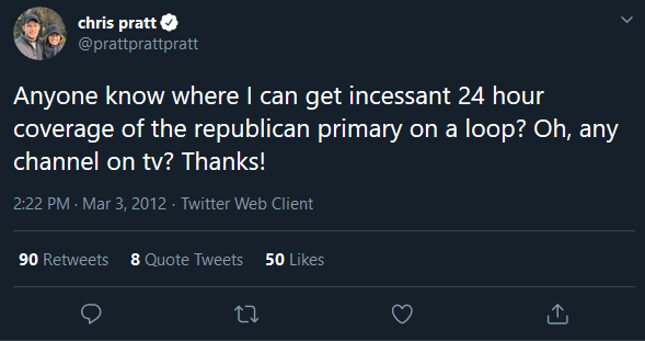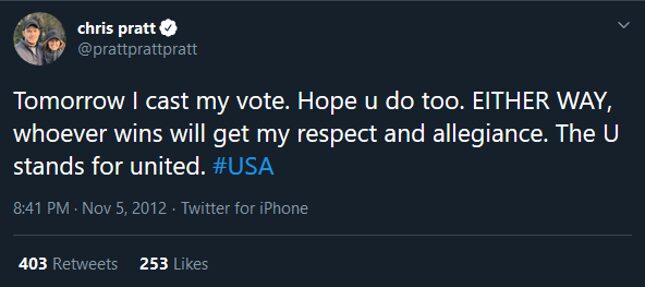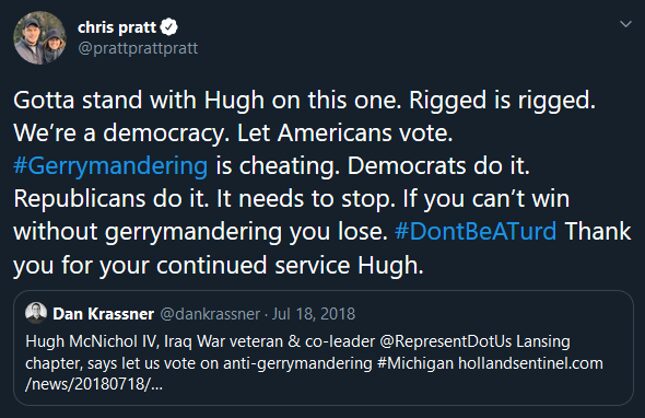Is Chris Pratt a Republican? I Tortured Myself With a Decade of Internet History For the Truth
Pratt has made few gestures at cementing a political brand.
In DepthIn Depth

Here is a list of facts about Chris Pratt: In 2008, he donated $250 to then-presidential hopeful Barack Obama. In 2010, he gave $500 to Democrat Barbara Boxer. He attends Hillsong Church, a celebrity hotspot which has also been repeatedly criticized for its homophobic teachings and practices. He is married to the daughter of one of California’s most incompetent Republican governors, actor turned public works destroyer Arnold Schwarzenegger.
Once known entirely as the somewhat charming breakout buffoon of NBC’s flagship comedy Parks and Recreation, Pratt’s stature has grown through his turn to action flicks, requiring a buff physique and Disney-approved visage.
As his career has blossomed, that blank canvas where his politics might exist has become a hotly contested battleground for America’s premiere every-dude turned action star. He exists on lists across the internet as one of Hollywood’s conservatives, despite no definitive evidence.
Pratt has made few gestures at cementing a political brand. While Hollywood has emerged from every possible news media orifice to demand we all vote, Chris Pratt has sat out fundraising events with co-stars and voting drives attended by former coworkers. On Instagram, the actor even composed a wrenching soliloquy about voting… for his movie Onward in the People’s Choice Awards.
With all that’s going on in the world it is more important than ever that you vote. Just ask any celebrity. They will tell you. Every day. Several times a day. To vote. But me? I will tell you EXACTLY who to vote for. #onward The heroes before us did not spill their blood only to have their sacrifices wasted by your apathy. The upcoming 2020 People’s Choice Awards is the most consequential vote in the history of mankind times a million infinity. Vote for #Onward for family movie of the year. Or else. You WILL die. No hyperbole. Click the link in my bio. Let your voice be heard.
Jokes about elections are a particularly sore spot, judging by how the post was lambasted across social media. The ill-timed bit coincided with the scandalous news that Pratt would not be involved with a voting drive featuring many of the most notable Avengers. While “Chris Evans, Scarlett Johansson, Paul Rudd, Mark Ruffalo, Don Cheadle, and Zoe Saldana will join Sen. Kamala Harris to participate in a grassroots fundraiser” for Joe Biden’s campaign, according to the Hollywood Reporter, Pratt would notably sit out the event. (Or he wasn’t invited.) Just last month, Pratt was also missing at a Parks and Recreation reunion in support of the Wisconsin Democratic Party.
According to the scholars at Twitter.com, these data points obviously mean that Chris Pratt is a Republican. How couldn’t he be? Look at his church; look at who he married. Remember when he said there wasn’t enough representation for white men?
The facts, however, tell a slightly more nuanced tale of Pratt’s political leanings.
According to information gathered entirely from an extensive search of his internet activity, Mr. Chris Pratt is not an avowed Republican, rather his politics seem informed by something much more apathetic and cynical.
Frankly, I’m not sure the truth is much better.
At the onset of this brief investigation, it’s important to note that recently, Pratt’s wife Katherine Schwarzenegger unleashed a series of Instagram Stories deriding Trump’s coronavirus response, and digging into his supporters. While she has “always been somebody who is super respectful of people’s choices to support whoever they want to support, especially politically,” Schwarzenegger
said she doesn’t understand “how you can support an individual like that.” An anti-Trump, yet vaguely non-partisan answer from a former Governor’s kid. Yet these Instagram Stories came days after the initial wave of “backlash” against Pratt’s Biden sidestep. Considering the mounting speculation against her husband, her response reads as planned.
Let me keep this in my back pocket, for now.
-

-

-

-

-

-

-

-

-

-

-

-

-

-

-

-

-

-

-

-

-

-

-

-

-

-

-

-

-

-

-

-

-

-

-

-

-

-

-

-












































